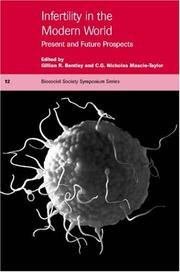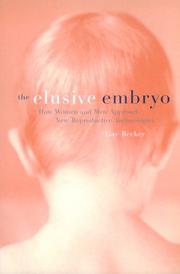| Listing 1 - 3 of 3 |
Sort by
|

ISBN: 1107116643 1280420456 9786610420452 0511175051 0511051948 051115514X 0511328648 0511613032 0511040407 9780511155147 6610420459 9780511175053 9780511040405 9780511328640 9780511613036 9780521643641 0521643643 0521643872 9780521643870 0521643643 9781107116641 9781280420450 9780511051944 Year: 2000 Publisher: Cambridge, UK ; New York : Cambridge University Press,
Abstract | Keywords | Export | Availability | Bookmark
 Loading...
Loading...Choose an application
- Reference Manager
- EndNote
- RefWorks (Direct export to RefWorks)
As we enter the twenty-first century, a number of medical, environmental and social changes have profoundly affected human reproduction. This book discusses some of the more dramatic changes in an accessible manner, illustrating the ways in which human biology and culture can affect fertility and providing a unique interdisciplinary perspective on the subject. Topics include medical technologies that equip us with potential cures for many causes of infertility; diseases such as AIDS that have a devastating impact on the reproductive and social lives of humans, particularly in areas with limited access to medical care; increasing industrialisation and the development of fabricated materials that pollute our environment in unforeseen ways with possibly devastating effects on human health and fertility; and, finally, social revolutions that profoundly alter human relationships, such as non-marital unions between heterosexual couples, same-sex relationships, adoption and surrogacy which are becoming increasingly common.
Infertility. --- Infertility --- Fertility, Human --- Human fertility --- Natality --- Demography --- Human reproduction --- Involuntary childlessness --- Sterility --- Sterility in humans --- Childlessness --- Generative organs --- Sterilization (Birth control) --- Social aspects. --- Diseases --- Life Sciences --- General and Others

ISBN: 0520224310 0520224302 9780520224315 Year: 2000 Publisher: Berkeley (Calif.) : University of California press,
Abstract | Keywords | Export | Availability | Bookmark
 Loading...
Loading...Choose an application
- Reference Manager
- EndNote
- RefWorks (Direct export to RefWorks)
Human reproductive technology --- Infertility --- Patients --- #SBIB:39A9 --- #SBIB:316.334.3M20 --- #SBIB:316.334.3M51 --- Involuntary childlessness --- Sterility --- Sterility in humans --- Childlessness --- Generative organs --- Fertility, Human --- Sterilization (Birth control) --- Assisted human reproduction --- Assisted conception --- Conception --- Human assisted reproduction --- Human reproduction --- Medical technology --- Reproductive technology --- Medische antropologie / gezondheid / handicaps --- Sociale epidemiologie en etiologie: sociale aspecten van ziekte en gezondheid --- Organisatie van de gezondheidszorg: modellen van therapeutisch handelen --- Diseases --- Technological innovations --- Assisted human reproductive technology --- Human assisted reproductive technology --- Human reproductive technology - Case studies. --- Infertility - Patients - Interviews.

ISBN: 159734589X 1282355090 9786612355097 0520925246 9780520925243 0585389926 9780585389929 9781282355095 9781597345897 6612355093 9780520224308 0520224302 9780520224315 0520224310 Year: 2000 Publisher: Berkeley University of California Press
Abstract | Keywords | Export | Availability | Bookmark
 Loading...
Loading...Choose an application
- Reference Manager
- EndNote
- RefWorks (Direct export to RefWorks)
In the first book to examine the industry of reproductive technology from the perspective of the consumer, Gay Becker scrutinizes the staggering array of medical options available to women and men with fertility problems and assesses the toll-both financial and emotional-that the quest for a biological child often exacts from would-be parents. Becker interviewed hundreds of people over a period of years; their stories are presented here in their own words. Absorbing, informative, and in many cases moving, these stories address deep-seated notions about gender, self-worth, and the cultural ideal of biological parenthood. Becker moves beyond people's personal experiences to examine contemporary meanings of technology and the role of consumption in modern life. What emerges is a clear view of technology as culture, with technology the template on which issues such as gender, nature, and the body are being rewritten and continuously altered. The Elusive Embryo chronicles the history and development of reproductive technology, and shows how global forces in consumer culture have contributed to the industry's growth. Becker examines how increasing use of reproductive technology has changed ideas about "natural" pregnancy and birth. Discussing topics such as in vitro fertilization, how men and women "naturalize" the use of a donor, and what happens when new reproductive technologies don't work, Becker shows how the experience of infertility has become increasingly politicized as potential parents confront the powerful forces that shape this industry. The Elusive Embryo is accessible, well written, and well documented. It will be an invaluable resource for people using or considering new reproductive technologies as well as for social scientists and health professionals.
Human reproductive technology --- Infertility --- Involuntary childlessness --- Sterility --- Sterility in humans --- Childlessness --- Generative organs --- Fertility, Human --- Sterilization (Birth control) --- Assisted conception --- Assisted human reproduction --- Assisted human reproductive technology --- Conception --- Human assisted reproduction --- Human assisted reproductive technology --- Human reproduction --- Medical technology --- Reproductive technology --- Patients --- Diseases --- Technological innovations --- biological parents. --- biology. --- birth parents. --- childbirth. --- conception. --- consumer culture. --- consumerism. --- cultural. --- embryo. --- emotional. --- feminism. --- fertility issues. --- fertility. --- finance. --- gender. --- global. --- in vitro fertilization. --- industry. --- international. --- medical. --- mental health. --- modern life. --- modern world. --- money problems. --- natural birth. --- parenting. --- pregnancy. --- reproduction. --- reproductive rights. --- reproductive technology. --- sexuality. --- social studies. --- technology. --- womens issues.
| Listing 1 - 3 of 3 |
Sort by
|

 Search
Search Feedback
Feedback About UniCat
About UniCat  Help
Help News
News